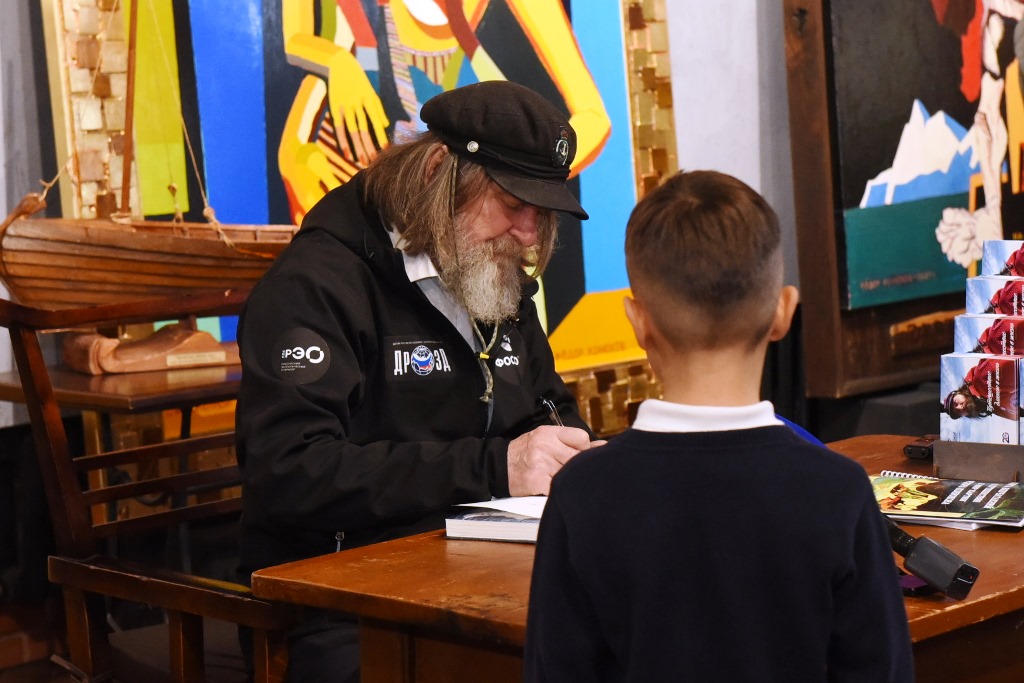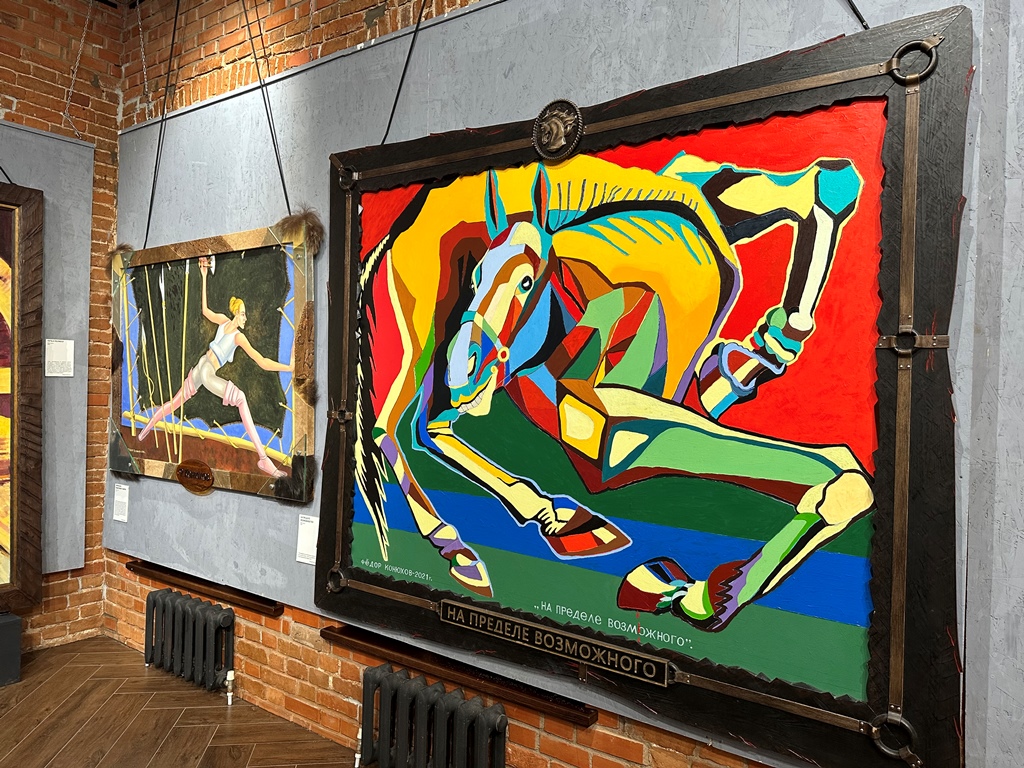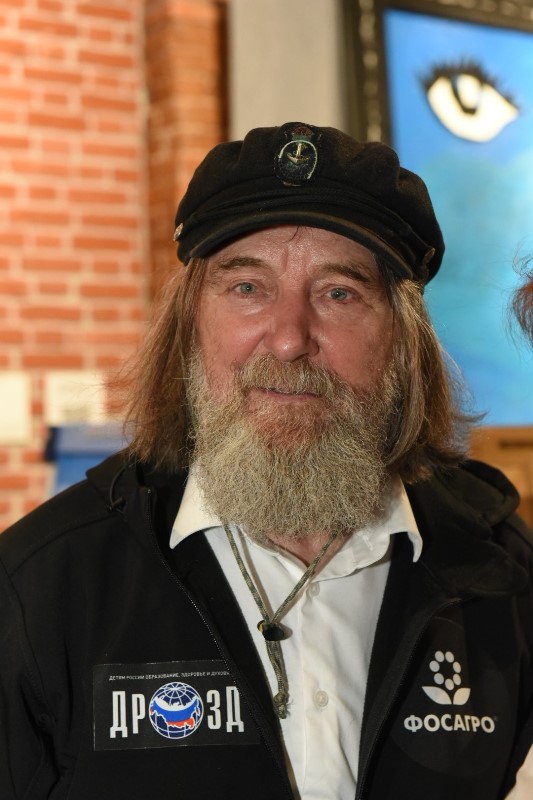
Fyodor Konyukhov: "Now all the world records are ours."
/ Главная / Russkiy Mir Foundation / Publications / Fyodor Konyukhov: "Now all the world records are ours."Fyodor Konyukhov: "Now all the world records are ours."
Sergey Vinogradov
Traveler Fedor Konyukhov has just made the longest nonstop balloon flight in the world, setting another world record. During the expedition Russian travelers Fyodor Konyukhov and Ivan Menyaylo covered a distance of 2540 km over the Arctic and Northern seas. The maximum height of the flight was 5,820 meters, and the maximum speed exceeded 100 km/hour.
Having landed in Khatanga (Taymyr), the traveler opened an exhibition of paintings in Cherepovets two days later and met with local children. They talked not only about flying in a hot-air balloon, but also about the importance of education, proper goal-setting and serving one's homeland. Fyodor Konyukhov often quoted scientific literature and the Bible, proving the same point.

Photo: Daria Levashova
"We, Russia, must love and worry not only about our country, we must love and worry about the whole world," he said. - Remember the Russian Geographic Society, Bellingshausen, Lazarev, Miklukho-Maklai and many other important names. They explored our entire planet."
The balloon flight was Konyukhov's twenty-fifth record; the next ones are planned for years ahead. Now he is 71 years old, he is a father, a grandfather and also a great-grandfather for the last year and a half. He already knows how he will celebrate his 80th birthday, he has planned a voyage on a raft, which to be called "Age is not an obstacle".
About the record
- Flying a balloon was difficult, but it had to be done for us, and Russia. The last record was held since 1997. There have been many attempts over the years, but we were the only ones to succeed. Why? In order to achieve the big goal, you need to mature both spiritually and materially, and that your health wouldn’t let you down. When all these things coincide, any goal is within reach. We had everything matched.
Now all the records on ballooning belong to Russia, for the range and duration of a non-stop hot-air balloon flight. No sooner had we landed than we started planning a new balloon trip. We flew over half of the country, and now we want to fly across all Russia, from Murmansk region to Chukotka. But we have to take twice as much gas and a bigger balloon.
How the flight went
- We flew over the seas and over the land 50/50. The frost was wild, I had never felt anything like that, not even when I was at the North Pole. When you fly in a balloon, you have to go standing, that's the difficulty. When you travel, when you get cold you can put up a tent, light a primus stove, eat hot porridge, drink tea or run on skis to get warm. While neither of it is possible; you can't even stomp around in a balloon.
We passed a night over the Barents Sea, 60 gas tanks were spent out of 80 we had. And we didn't even make it halfway. We thought we would not make it to the record. We could only make it to the shore, and even that was hard. And we needed to find a suitable landing, we should save 3 or 4 cylinders for that. You have to land in the morning or evening when there is no wind. You won't land in the afternoon. To make a long story short, we had to choose, either to land in the evening, but then there would not be enough for a record, or to wait until morning, but there was no guarantee there would be enough cylinders. We were also running out of oxygen, Vanya would breathe and then shared with me.
Despite having a means of salvation, we were still at risk if we had landed on the water. The low temperatures would have been a challenge for us to withstand for 10-15 minutes, and although rescue attempts would have been made, they would have been difficult due to the inability of ships and planes to approach us. Additionally, it would have taken some time for a helicopter to locate us in such a remote area.
As we were flying, we couldn't help but wonder about the consequences of a potential crash. We were worried that people abroad would mock us for failing and associate our mistakes with our Russian identity. Instead of individual accountability, our nationality would have been the focus of their criticism. This fear made us feel like we had to persevere no matter what. With faith and hope, we were able to pull through and land safely in Khatanga. Although we had enough fuel to last for two to three hours after landing, we knew that had we crashed further away in the tundra, a more complicated rescue mission would have been required.

Exhibition of paintings by F. Konyukhov in Cherepovets. Photo: Darya Levashova
On Mars and setting goals
People ask me why I keep going to Everest again and again, when I have already been there twice, from the north and south sides. They say that I need to prepare for climbing Mars and the Moon. Why do I climb Everest? It is a unique feeling to stand on the summit and realize that there is no point on Earth higher than this. But on Mars, there is Mount Olympus, which is 26 kilometers high, the highest in the solar system. That is three times higher than Everest. If I were young, I would set a goal to conquer other planets. My advice to young people is to set ambitious goals as early as possible, so that they have time to achieve them. It may take 20, 30, or even 50 years, as it does for me. But don't be afraid of time; it is flexible and can be compressed if you want.
Why is all this necessary? There was a well-known Japanese traveler named Naomi Uemura, who I consider my teacher. He reached the North Pole alone in 1978, becoming the first person to do so. By the way, I was third in 1990. Naomi Uemura said that he was expanding human capabilities by doing alone what used to be done by a team.
Don't be afraid to learn
Set a goal and go for it. You need to learn first. To climb Everest, I have been doing mountaineering since I was 19 years old, and then I accumulated strength and knowledge for 20 years. And in 1992, I conquered it. You need to learn constantly, at any age. Otherwise, they say, "I graduated from university, there is nothing left to learn?" What is one university? You need to graduate from five or even ten of them.
You became an engineer, learn to be an art historian, for example. You became a pilot, why not learn to play the piano? When I make a long transition, I sit down and write books. Or paintings. You know, it's great!
And you need to work constantly. To master the knowledge and skills of ballooning, I went to study 10 years ago. In Germany, I learned to fly on hydrogen, in Italy - on hot air balloons, and, of course, in Russia. Ivan Menyaylo, with whom we set the last record, is my teacher. And earlier, I studied to be an airplane pilot. Honestly, learning at my age is not easy, young guys catch on faster. I won't deny it, I failed exams, anything can happen. Don't be afraid to learn.
How to become a traveler?
When young people ask me how they can become travelers like me, I often question their motivation. "Why do you want to see the world?" I ask. Some reply that they simply have a desire to explore new places. But when I suggest they consider becoming composers or writers instead, they often admit that they lack the necessary talent. To this, I reply, "What makes you think you can become a traveler without talent or knowledge?"
Personally, my own journey to the North Pole required many years of preparation. I first attended a maritime school, then went on to study as a mechanic at the Leningrad Arctic School, where I learned to generate light at polar stations. Over the course of 30 years, I acquired many other skills that were necessary for my polar trek. In short, becoming a successful explorer takes a lot of hard work and dedication.

Fedor Konyukhov. Photo: Darya Levashova
Or I often hear people say, "I can endure any journey because I'm into sports." That's great, but to be a traveler, sports alone are not enough : one needs to develop spiritually. Many of my friends achieved a lot in sports, but it didn't prevent them from letting their lives go off the rails. All they had was sports, but what was in their hearts?
Read more: Across the oceans in Old Russian vessel rook
About Money and Fame
- Young people ask me, how do I become famous? That's a dangerous question. My father, a sailor, used to say: "Fedka, don't chase money and fame, otherwise both will escape. Do your job, and everything else will come with it. You'll have money and fame will come."
About the plans
- When the traveler Naomi Uemura was alive, I was worried that he would set all the world records and I would have nothing left. But there are enough records and travels for any century. I now have 25 world records, and there are travelers who have twice as many. I understand that I will not succeed in everything I have planned. Now I will go on a catamaran, a rowing boat... I have several expeditions planned for each year. And by 2033 I will have a raft built, like Thor Heyerdahl's, and I will follow the same route across the Pacific Ocean. I have already thought up a name for the raft: "Age is no barrier.
New publications

 Mikhail Kalatozov, a director who transformed the world of cinematography in many ways, was born 120 years ago. He was a Soviet film official and a propagandist. Above all, he was capable of producing movies that struck viewers with their power and poetic language.
Mikhail Kalatozov, a director who transformed the world of cinematography in many ways, was born 120 years ago. He was a Soviet film official and a propagandist. Above all, he was capable of producing movies that struck viewers with their power and poetic language.  Ukrainian authorities have launched a persecution campaign against the canonical Ukrainian Orthodox Church (UOC), the biggest one in the country's modern history. Over the past year, state sanctions were imposed on clergy representatives, searches were conducted in churches, clergymen were arrested, criminal cases were initiated, the activity of the UOC was banned in various regions of the country, and monasteries and churches were seized.
Ukrainian authorities have launched a persecution campaign against the canonical Ukrainian Orthodox Church (UOC), the biggest one in the country's modern history. Over the past year, state sanctions were imposed on clergy representatives, searches were conducted in churches, clergymen were arrested, criminal cases were initiated, the activity of the UOC was banned in various regions of the country, and monasteries and churches were seized.  When Nektary Kotlyaroff, a fourth-generation Russian Australian and founder of the Russian Orthodox Choir in Sydney, first visited Russia, the first person he spoke to was a cab driver at the airport. Having heard that Nektariy's ancestors left Russia more than 100 years ago, the driver was astonished, "How come you haven't forgotten the Russian language?" Nektary Kotlyaroff repeated his answer in an interview with the Russkiy Mir. His affinity to the Orthodox Church (many of his ancestors and relatives were priests) and the traditions of a large Russian family brought from Russia helped him to preserve the Russian language.
When Nektary Kotlyaroff, a fourth-generation Russian Australian and founder of the Russian Orthodox Choir in Sydney, first visited Russia, the first person he spoke to was a cab driver at the airport. Having heard that Nektariy's ancestors left Russia more than 100 years ago, the driver was astonished, "How come you haven't forgotten the Russian language?" Nektary Kotlyaroff repeated his answer in an interview with the Russkiy Mir. His affinity to the Orthodox Church (many of his ancestors and relatives were priests) and the traditions of a large Russian family brought from Russia helped him to preserve the Russian language.

 The leaders of the Friends of the Great Russia cultural association (Amici Della Grande Russia) in Italy believe that the Western policy of abolishing Russian culture in Europe has finally failed. Furthermore, it was doomed to failure from the beginning.
The leaders of the Friends of the Great Russia cultural association (Amici Della Grande Russia) in Italy believe that the Western policy of abolishing Russian culture in Europe has finally failed. Furthermore, it was doomed to failure from the beginning.  Name of Vladimir Nemirovich-Danchenko is inscribed in the history of Russian theater along with Konstantin Stanislavski, the other founding father of the Moscow Art Theater. Nevertheless, Mr. Nemirovich-Danchenko was a renowned writer, playwright, and theater teacher even before their famous meeting in the Slavic Bazaar restaurant. Furthermore, it was Mr. Nemirovich-Danchenko who came up with the idea of establishing a new "people's" theater believing that the theater could become a "department of public education."
Name of Vladimir Nemirovich-Danchenko is inscribed in the history of Russian theater along with Konstantin Stanislavski, the other founding father of the Moscow Art Theater. Nevertheless, Mr. Nemirovich-Danchenko was a renowned writer, playwright, and theater teacher even before their famous meeting in the Slavic Bazaar restaurant. Furthermore, it was Mr. Nemirovich-Danchenko who came up with the idea of establishing a new "people's" theater believing that the theater could become a "department of public education."  "Russia is a thing of which the intellect cannot conceive..." by Fyodor Tyutchev are famous among Russians at least. December marks the 220th anniversary of the poet's birth. Yet, he never considered poetry to be his life's mission and was preoccupied with matters of a global scale. Mr.Tyutchev fought his war focusing on relations between Russia and the West, the origins of mutual misunderstanding, and the origins of Russophobia. When you read his works today, it feels as though he saw things coming in a crystal ball...
"Russia is a thing of which the intellect cannot conceive..." by Fyodor Tyutchev are famous among Russians at least. December marks the 220th anniversary of the poet's birth. Yet, he never considered poetry to be his life's mission and was preoccupied with matters of a global scale. Mr.Tyutchev fought his war focusing on relations between Russia and the West, the origins of mutual misunderstanding, and the origins of Russophobia. When you read his works today, it feels as though he saw things coming in a crystal ball...